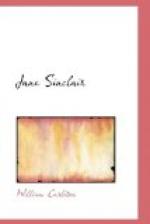The appearance of Osborne, unaccompanied, taught this young creature to know the full extent of his influence over her. Delight, terror, and utter confusion of thought and feeling, seized upon her the moment he became visible. She wished herself at home, but had not power to go; she blushed, she trembled, and, in the tumult of the moment, lost all presence of mind and self-possession. He had come from behind a hedge, on the path-way along which she walked, and was consequently approaching her, so that it was evident they must meet. On seeing her he ceased to play, paused a moment, and were it not that it might appear cold, and rather remarkable, he, too, would have retraced his steps homewards. In truth, both felt equally confused and equally agitated, for, although such an interview had been, for some time previously, the dearest wish of their hearts, yet would they both almost have felt relieved, had they had an opportunity of then escaping it. Their first words were uttered in a low, hesitating voice, amid pauses occasioned by the necessity of collecting their scattered thoughts, and with countenances deeply blushing from a consciousness of what they felt. Osborne turned back, mechanically, and accompanied her in her walk. After this there was a silence for some time, for neither had courage to renew the conversation. At length Osborne, in a faltering voice addressed her:
“Your dove,” said he, “is quite recovered, I presume.”
“Oh, yes,” she replied, “it is perfectly well again.”
“It is an exceedingly beautiful bird, and remarkably docile.”
“I have had little difficulty in training it,” she returned, and then added, very timidly, “it is also very affectionate.”
The youth’s eyes sparkled, as if he were about to indulge in some observation suggested by her reply, but, fearing to give it expression, he paused again; in a few minutes, however, he added—
“I think there is nothing that gives one so perfect an idea of purity and innocence as a snow-white dove, unless I except a young and beautiful girl, such as—”
He glanced at her as he spoke, and their eyes met, but in less than a moment they were withdrawn, and cast upon the earth.
“And of meekness and holiness too,” she observed, after a little.
“True; but perhaps I ought to make another exception,” he added, alluding to the term by which she herself was then generally known. As he spoke, his voice expressed considerable hesitation.
“Another exception,” she answered, inquiringly, “it would be difficult, I think, to find any other emblem of innocence so appropriate as a dove.”
“Is not a Fawn still more so,” he replied, “it is so gentle and meek, and its motions are so full of grace and timidity, and beauty. Indeed I do not wonder, when an individual of your sex resembles it in the qualities I have mentioned, that the name is sometimes applied to her.”




